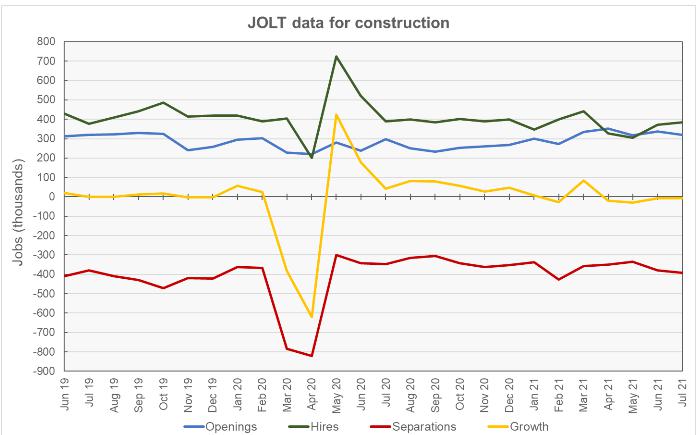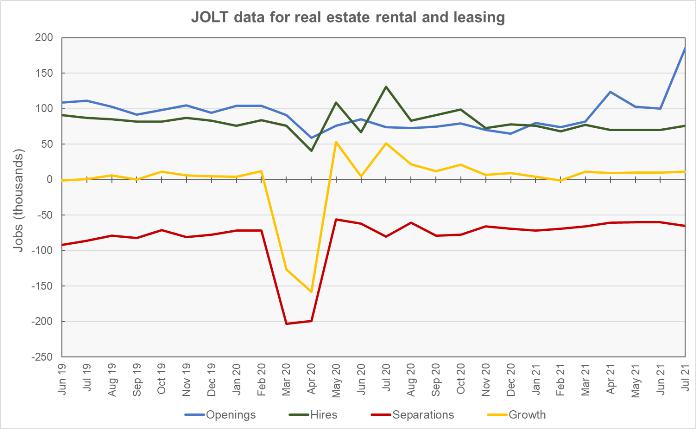The Bureau of Labor Statistics (BLS) recently released the Job Openings and Labor Turnover (JOLT) report for July. It again reported a series record for the highest number of job openings.
Assessing the overall jobs market
For a discussion of the JOLT report and how it relates to the Employment Situation Report, please see the paragraph at the end of this article.
The BLS reported that there were 10.9 million job openings at the end of July. This represents 6.9 percent of the total employment plus job openings. For comparison, the unemployment rate in August was 5.2 percent.
Within the nonfarm labor market, the number of people hired for a new job was 6.7 million while the number of people leaving their old jobs was 5.8 million. Of those leaving their jobs, 4.0 million left voluntarily, while 1.5 million people were involuntarily separated from their jobs. The remainder of people leaving their jobs left for other reasons, such as retirements.
Construction jobs down slightly
The first chart, below, shows the employment situation for the construction jobs market over the last 25 months. It shows that the construction jobs market has suffered a net loss in employment in 5 of the last 6 months.

Revisions to June’s data were nearly balanced with the number of hires adjusted upward by 13,000 and the number of separations adjusted upward by 14,000, resulting in a minimal change in the job losses reported for the month.
In July, openings for construction jobs fell 5 percent from June’s revised figure (-1,000) to 321,000 jobs. Hiring was up in July, rising 3.5 percent from June’s revised figure (+13,000) to 384,000 jobs.
Construction jobs separations rose by 3 percent in July to 391,000 jobs. Quits rose by 7.6 percent to 199,000 jobs while layoffs fell by 3.2 percent to 177,000 jobs. “Other separations” which includes retirements and transfers, were up by 36 percent to 15,000 jobs. Quits represented 55 percent of separations for the month. A high portion of quits means that people are confident that they can get a job if they want one.
RERL jobs growth stays positive
The last chart, below, shows the employment situation for the real estate and rental and leasing (RERL) jobs category. Employment growth in this jobs category was again positive in July, extending the sting of job gains to 5 months in a row.

The number of job openings in the RERL category took a huge leap in July, rising 86 percent to 186,000 jobs. No explanation for this increase was given in the report, but job openings for the other category within Financial Activities, Finance and Insurance, also took a big jump in July, rising 50 percent.
Hiring in July was up 8.6 percent from June’s revised (+6,000) figure to 76,000 jobs.
Separations in July were up 8 percent to 65,000 jobs. Quits were up 6 percent in July to 52,000 jobs. They represented 80 percent of total separations despite layoffs rising to 10,000 jobs.
The numbers given in the JOLT report are seasonally adjusted and are subject to revision. It is common for small adjustments to be made in subsequent reports, particularly to the data for the most recent month. The full current JOLT report can be found here.
The reports
The US labor market is very dynamic with many people changing jobs in any given month. The JOLT report documents this dynamism by providing details about job openings, hiring and separations. However, it does not break down the jobs market into as fine categories as does the Employment Situation Report, which provides data on total employment and unemployment. For example, while the Employment Situation Report separates residential construction from other construction employment, the JOLT report does not. The Employment Situation Report separates residential property managers from other types of real estate and rental and leasing professionals, but the JOLT report does not. However, the JOLT report provides a look at what is driving the employment gains (or losses) in broad employment categories.












